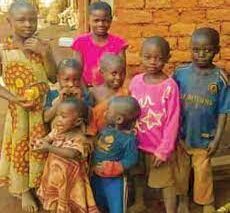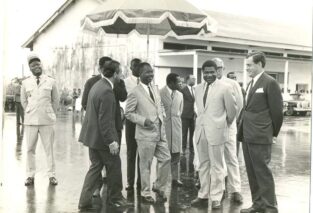I have had a feeling for sometime now that the rift within the Anglophone community of the Ahidjo-Foncha-Muna days in Yaoundé has not been sufficiently addressed, if it has ever been given any serious thought at all.
The rift in question, which had been at best latent at the outset, was put in overdrive by Ahidjo, the notorious schemer that he always was, when he unceremoniously ejected the Honourable Dr. John Ngu Foncha from the vice-presidential seat in favour of Honourable Solomon Tandeng Muna in 1965. To many of Foncha’s supporters Muna was seen as an equally slippery opportunist, who took an obscene delight in dancing to the Foulbe man’s whims and caprices. Foncha’s KNDP stalwarts never forgave Muna for what they saw as his role in Ahidjo’s humiliation of their leader. This situation was further exacerbated by the equally humiliating ejection of the turbulent, vibrant and fearless Honourable Augustine Ngom Jua from the prime ministerial seat in the West Cameroon government in Buea in 1968.
Dr. Bernard Nsokika Fonlon
I know one person who was very vocal in his condemnation of the Honourable Solomon Tandeng Muna, who then doubled as Vice President of the Republic and Prime Minister of West Cameroon; that was Doctor Bernard Nsokika Fonlon, then the boss of the Ministry of Transport and later the Ministry of Public Health.
Dr. Fonlon was particularly infuriated by what he saw — and many agreed with him — as Muna’s backstabbing actions in West Cameroon politics. Not being one who merely grumbled in his beard in hiding, Fonlon confronted Muna openly. The latter had just returned to Yaoundé from Buea, still gleefully fondling the prime ministerial trophy he had just bagged at the expense of the Honourable Augustine Ngom Jua a few days earlier.
Political commentators tell us that the newly deposed Jua had been left panting by the roadside after the humiliating knocks he had earlier received when an envelope from Ahidjo mysteriously appeared on the floor of parliament and its content stunned all parliamentarians to silence, and with good reason, for it gave an astonished Jua marching orders. From one corner of the building, a triumphant Muna emerged from nowhere, lifted shoulder high by his supporters and beaming a broad smile from ear-to-ear. Augustine Ngom Jua, who had been chauffeured into the parliament building earlier that morning under police escort, found himself trembling in the Buea cold on the roadside, only being rescued by a sympathetic friend, who was kind enough to give him a ride home where he slumped into the trembling waiting arms of his stunned wife.
The late NN Mbile, a former West Cameroon parliamentarian and privileged witness of the political intrigues of the day, gives a fascinating eye-witness account of what happened in the parliament in Buea that day in 1968: Let’s take a listen to him: “As the early days of January 1968 dawned on sleepy Buea, a rustle of political wind swept through the air. For, faithful to law and custom, the President of the Republic was due soon in Buea to appoint a new Prime Minister. Most people expected the reappointment of Mr. Jua as his government was considered fairly popular and established. He had taken the biggest step of all towards the realisation of the much talked of national party by establishing a coalition government between the KNDP and CPNC in Buea. His rival (Muna) during the 1965 feud, was not a member of the West Cameroon House of Assembly, and even though the constitution now allowed a non-member to be appointed, many did not expect this to happen…
It was early January 1968 at Buea, there was excitement and fever everywhere. Flags and buntings were fluttering in the morning air of the West Cameroon state capital… as the hour of ten drew near, crowds of people were seen streaming towards the West Cameroon House of Assembly building. Soon, the members of the House began arriving to take their seats. The public gallery was packed to overflowing. The police band in their brilliant white uniforms and gleaming instruments were playing popular tunes…
At the stroke of ten, there were three loud bangs at the door behind the Speakers’ chair, and at the end of the third bang, the door was opened by the Sergeant at Arms. In walked Speaker Effiom wearing his full robes and wig… There was now dead silence that one could hear a pin drop… All eyes were fixed on the speaker for he had at the moment an important message for the House and the State from the President of the Republic.
As the Speaker and the House waited, a dispatch rider from the “Presidency” arrived and saluting the chair handed him an envelope. He rapidly unfolded it, turned his eyes to the members and said: “Honourable members I have a message from his Excellency the President of the Republic which I wish to convey to the house.” Then he turned to the paper and began reading something similar to the following: “I, Ahmadou Ahidjo, President of the Federal Republic… name Solomon Tandeng Muna the Prime Minister of the Federated State of West Cameroon”.
The words fell on all, like an electric shock… there rose such a spontaneous roar from the assembled crowd that the din of human voices could be heard for miles around the mountain slopes…
Mr. Muna striding down the pavement to the doors of the National Assembly and being heavily cheered by the crowd was swept into the Prime Minister’s waiting Mercedes. Mr. Jua just had enough nerve to rise from his seat and walk out to the veranda where he waited patiently until an Opel Record came round into which he was whisked to the Schloss (Prime Minister’s Lodge)…”. (cf: Cameroon Political Story: Memories of an Authentic Eye Witness, Presprint, 1999, pp. 202-204).
Ah, the intrigue-ridden vicissitudes of political life in Cameroon! Habah! Habah! Wallahi! Abaii-veni! Man no run-ooh!
Solomon Tandeng Muna
That downright humiliating treatment meted out to Foncha and, not long thereafter to his successor Augustine Ngom Jua was something Fonlon found difficult to swallow. Upon Muna’s return to Yaoundé, he (Fonlon) drove to the former’s residence, and in no uncertain terms, and in an eye-ball-to-eyeball confrontation, gave the astonished VP a piece of his mind over what he saw as his slimy role in the less-than-elegant eviction from power of the two KNDP leaders: John Ngu Foncha and Augustine Ngom Jua. Fonlon termed VP Muna’s action an unforgivable affront to the dignity and integrity that had hitherto largely characterized the Anglophone political scene in Cameroon, notwithstanding existing disagreements there might have been among the politicians. To crown it all, Fonlon vowed never to attend any ceremony presided over by Vice President Muna, nor would he ever be at the airport to receive the latter whenever he returned to Yaoundé from out of town, as protocol seemed to demand of ministers.
There was definitely no love lost between the two men. On the one hand, ST Muna was a battle-scarred politician, who was no stranger to the ruggedness and roughness of political battles and intrigues from where he had often emerged largely unscathed in the halls of political power in Lagos or Enugu, Nigeria, or in the back streets of Nigerian cities in colonial times. Those were battles, with thugs being frequently thrown into the arena, from where the victor would often emerge joyfully brandishing the entire trophy, leaving nothing to the opponent except a bloody nose, smashed teeth and broken limbs, and taking no prisoner from the opposing camp. That was a world ruled by political thuggery and hooliganism of the worst kind.
On the other hand, there was Doctor Bernard Nsokika Fonlon, a suave, polite, truly and complexly enigmatic personality, if ever there was any, totally seasoned in celibacy and in the humanities, having been thoroughly schooled in the rigours of seminary life and in the exigencies of studies in other world-renowned universities – the Sorbonne in Paris, Oxford University in London and the University of Ireland. Elegant in style, fluent in speech, a baritone that made all who heard him sit up and listen and pay attention, spartan in dressing (not much to write home about in this domain as he was almost always dressed in worn-out danshikis with feet eternally clasped in flat-bottomed slippers), dignified in gait with an ever shy and hard-to-discern smile on his lips. Fonlon was a man who seemed to have stumbled by accident into the intrigue-infused political life of the Cameroons of his day, often baffling many a political colleague — the dreaded Ahidjo included – with his irritating insistence that priority be given at all times to the human side of life, which, as he incessantly preached, should hold sway over the avarice of political life. The open clash between Muna and Fonlon, two political titans, with glaringly opposed views of life, sent violent shock waves bashing the usually placid hand-clapping surface of the political waters of Cameroon’s politics.
Another case in point is what I heard from my brother, Kenjo Jumbam, the author of the novels: “The Whiteman of God”, “The Whiteman of Cattle,” and “Lukong and the Leopard,” who was Fonlon’s private secretary in those days. One thing Fonlon rejected, among numerous other perks that went with the ministerial turf in Cameroon, was a direct telephone line into his office. With the easy access we have these days to mobile telephony and instant internet connection, it is hard to imagine that it was a privilege of enormous proportion to have access to a direct telephone line. Fonlon insisted that all his calls vetted at his secretariat for him to determine which ones to receive and which to reject.
One morning, the phone rang in the secretariat and when my brother picked up the receiver, a voice at the other end identified the caller as Vice President Muna in person, asking to talk with the Honourable Minister Fonlon. My brother was so stunned that he immediately placed the receiver on his desk, forgetting to put the call on hold, and rushed to the minister’s office, announcing as he opened the door that His Excellency the Vice President of the Republic was on the line for him; could he pass him the call? Fonlon became furious and shouted a categorical and loud “No! I don’t want to talk to him.” It was clear to my brother that he did not seem to give a hoot if his what he was saying had tickled Muna’s vice-presidential ears or not. He was so loud that Kenjo was sure VP Muna could hear him. When he returned to his desk, totally confused and not knowing what to say, and just as he was about to pick up the receiver, he heard a click followed by a few beeps, an indication that the VP must have heard Fonlon’s rejection of his call and decided to hang up.
The Fonlon-Muna confrontation was just one among many rivalries that characterized the rather uneasy peace among the Anglophone elite in the Ahidjo-Foncha-Muna days in Yaoundé. My good friend Dibussi Tande, a US-based seasoned analyst of the political scene in Cameroon for several years now, reminded me the other day of the equally captivating Fonlon-Sankie Maimo confrontation that had spilled over onto the pages of Cameroon Tribune for several months, much to the utter delight of the readers of that paper. In Fako, there was the now infamous Njoh Litumbe-SML Endeley rivalry that led to deep-seated personal animosity that stretched on for several decades. There are certainly more of such instances of political bad blood that underpinned the relations among West Cameroon politicians of the day. Many of such rivalries are urgently calling for the surgical incisiveness of well-heeled political analysts.
Coming back to the case in hand, the Fonlon-Muna controversy was a clear indication of the widening divide between Foncha’s Kamerun National Democratic Party (KNDP) and Muna’s newly-created Cameroon United Congress (CUC) party, which was nothing but a watered-down version of Ahidjo’s Cameroon National Union (CNU) party. ST Muna, who had been one of the original members of the Foncha-led KNDP, found himself at loggerheads with Foncha and the other KNDP leaders, who finally got fed up with him and tossed him out in the cold. Not being one who could just tiptoe out of a confrontation to lick his political wounds at a corner, Muna swung back with a vengeance, entering into a league with Emmanuel Tabi Egbe from Mamfe and Boniface Tatah Sakah from Nsoland to create the CUC in West Cameroon, leading many a political observer to clearly see behind their move the hidden hand of the notorious and much-feared schemer, Ahmadou Babatoure Ahidjo, a sneaky, intrigue-seasoned man who never trusted any Anglophone leader, seeing a secessionist in each of them. He was therefore only too happy to stoke the embers of division among those who were with him in Yaoundé. There have been numerous testimonies to this fact from credible sources over the years.
It is my hope that Fonlon’s biography, if any is in the pipeline, might reveal his thoughts on his relationship with the Right Honourable Vice President Solomon Tandeng Muna; but I bet you it might not hold anything flattering to the ear in this regard. I am not privy either to Vice President ST Muna’s views of his intriguingly enigmatic colleague, if any such reference appears in his biography, which I understand has seen the light of print but which I have, unfortunately, not had the privilege to read. Since both men are now with their Maker, I am sure that Saint Peter, the Pearly Gate Keeper, would by now have brokered an uneasy peace deal among the Ahidjo-Muna-Fonlon triumvirate for the sake of peace in heaven. We shall only know when we too join them, as we each are wont to do one day – sooner or later.


